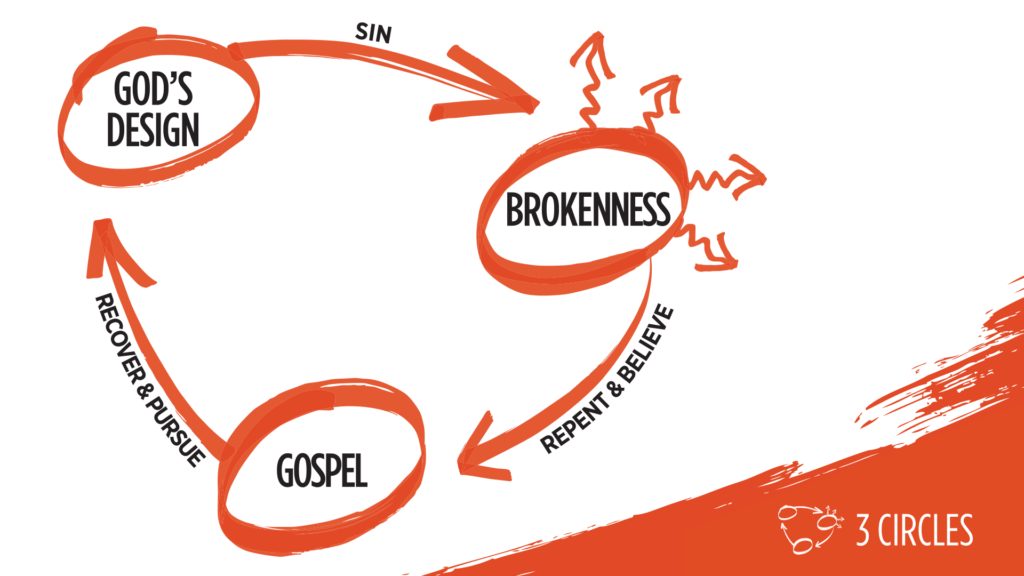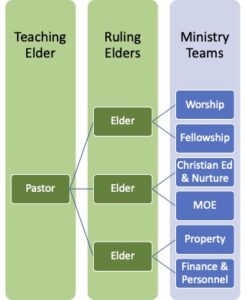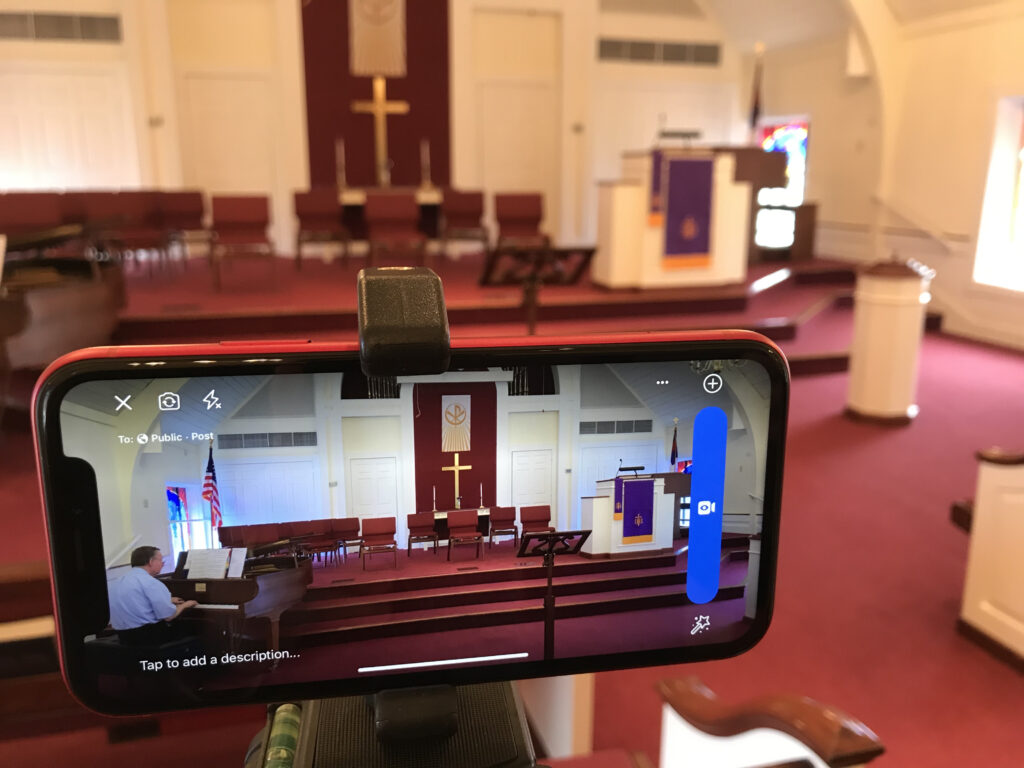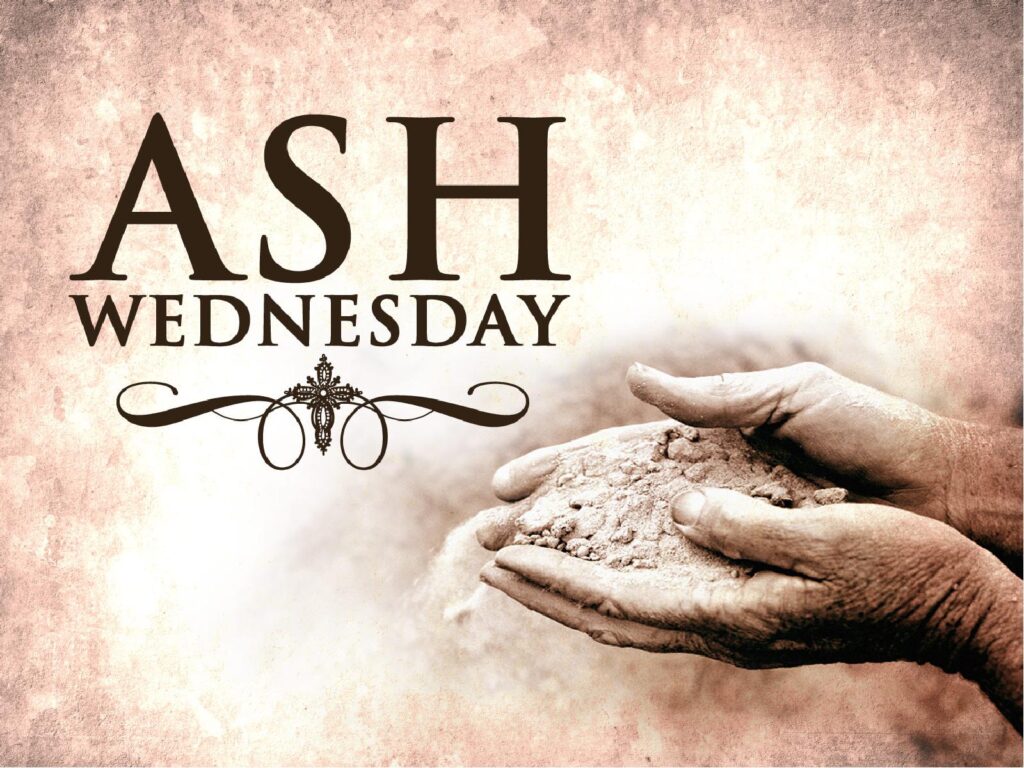
September 2025 Pastor’s Corner — 3 Circles

And he said to them, “The harvest is plentiful, but the laborers are few. Therefore pray earnestly to the Lord of the harvest to send out laborers into his harvest. Go your way; behold, I am sending you out as lambs in the midst of wolves.” — Luke 10:2-3
Last fall we had a couple of town hall meetings to discuss the state and future of our church. To recap: like many churches, we have seen a significant decline in worship attendance and engagement in the life of our church. While for the most part our income has remained steady, it is also declining. Up until last fall, we had seen very few visitors to our church, and those who did visit usually did not return. It seemed as if, while we love our church and what we offer, it wasn’t resonating or connecting with others in our community. Our circumstances seemed discouraging, to say the least. One year later, we’ve often been asked about where things stand and if we are as concerned as we were.
When you look at the practical numbers — worship attendance and income — not much has changed. Our average worship attendance is about the same as it was last fall, and our income is just slightly lower. But those numbers only tell one part of the story, and not the most important part. Since last fall we have had a steady increase in visitors to our church, which led to our largest Inquirer’s Class in the past 8 years. One new regular attender commented, “I didn’t know churches like yours existed any more.” Where we often wonder if our church is declining into irrelevance, another visitor sees a community that has deep faith and deep relationships, the very things she has been needing and looking for.
Where did these new visitors come from? In almost every case, the answer is the same: Someone invited me. In fact, when you boil every church growth and evangelism strategy down to its core, it’s always about some form of personal invitation. It’s how the Gospel spread in the very beginning, and it’s how the Church has grown ever since. Telling others about Jesus is something that all believers are called and invited to do. As Jesus and the Holy Spirit change and transform us, we are invited to share that transformation with others.
The most important part of our life of faith is for us to be looking to see how we are growing as disciples of Jesus Christ, paying attention to how the Holy Spirit is making us into new creations, formed in the image of our Savior: “Therefore, if anyone is in Christ, he is a new creation. The old has passed away; behold, the new has come.” (2 Corinthians 5:17) Think about it this way: when something good happens in our lives or when we have good news to share, we naturally and instinctively want to share that with the people around us. When we see how Jesus has changed us, we want to share that change with others. This change is a process that happens throughout our lives on this side of Glory. Look for how the Holy Spirit has changed you and how you are growing as a disciple. If you aren’t sure how that change is happening in your life, consider asking what the Holy Spirit might be inviting you to change or do differently so you can experience the change He wants to bring about in you.
Sometimes, though, even when we know how we are being changed, we hesitate or aren’t sure how to share that with others. We know Jesus has told us to tell others about the good news of God’s grace, but don’t want to be pushy or offensive. In fact, this is one of the most common questions we’re asked: I know I’m supposed to tell others about Jesus, but I don’t know what to say. To that end, we are going to spend time in September talking about a model for sharing your faith called “The Three Circles.” This is a slightly different model than others you might already know. The emphasis with The Three Circles is helping you learn how to turn everyday conversations into Gospel conversations. We’ll introduce the Three Circles in a three week sermon series, which will be followed by a six week Sunday School class.
If we want to see Northminster grow, it simply comes down to telling others about Jesus and inviting them to church to learn more about Him. The elders and I encourage everyone to join us for worship and plan to participate in the Sunday School class. We’re excited about how the Lord will use the Three Circles to help us share the good news of the Gospel of Jesus Christ with our friends, our family, and the community around us. Find more information about the Three Circles Sunday School class on page seven of the newsletter, or by clicking here..
How then will they call on him in whom they have not believed? And how are they to believe in him of whom they have never heard? And how are they to hear without someone preaching? And how are they to preach unless they are sent? As it is written, “How beautiful are the feet of those who preach the good news!” — Romans 10:14-15
Blessings,
Rev. David Garrison
Read more...

June 2025 Pastor’s Corner — Get In Shape

For as in one body we have many members, and the members do not all have the same function, so we, though many, are one body in Christ, and individually members one of another. Having gifts that differ according to the grace given to us, let us use them: if prophecy, in proportion to our faith; if service, in our serving; the one who teaches, in his teaching; the one who exhorts, in his exhortation; the one who contributes, in generosity; the one who leads, with zeal; the one who does acts of mercy, with cheerfulness. — Romans 12:4-8
I’m willing to bet that just about every time you visit the doctor for your annual checkup, he or she says something along the lines of, “you’re a bit out of shape and need to eat healthier and get more exercise.” Then again, maybe that’s just what the doctor always tells me. Regardless, study after study has shown that we are becoming more physically sedentary and what we eat isn’t doing us any favors. Time and again Scripture reminds us that what is true physically is even more true spiritually, and that our spiritual needs are actually more important and pressing than our physical ones. If getting in shape physically is important for a healthy body, then getting in shape spiritually is essential for the Body of Christ.
In Philippians 4:19 it says, “my God will supply every need of yours according to his riches in glory in Christ Jesus.” God has provided everything we need in order to faithfully follow Him, and He has provided everything we need as a community of faith, the body of Christ, to fulfill the mission and work He’s given us. Knowing how God has formed and shaped us for mission and ministry is an essential part of our growth as disciples of Jesus Christ, and the church can not function as God has designed it if we don’t know where we fit in His Body. If you’ve been part of a church for a long time, you’ve likely heard talk about or been part of classes helping you learn your spiritual gifts, but how God has shaped us for ministry goes beyond just those gifts. A helpful acrostic to think about this is SHAPE — Spiritual gifts, Heart, Abilities, Personality, and Experience. While the gifts and personality God has given us might not change, our heart and abilities do, so where we might have had the ability to serve God in one way in our 20s, when we’re in our 60s or 70s our ability is different. The invitation and call to serve is still there, but how God is inviting us to live that out changes.
Knowing our SHAPE is just one part of the puzzle, though. It’s also about looking at the ministry and service needs of the Body here at Northminster and seeing where out SHAPE fits into those opportunities. As Frederick Buechner once wrote, “The place God calls you to is the place where your deep gladness and the world’s deep hunger meet.” To push the analogy perhaps a bit too far, if you discover that your spiritual SHAPE is a circle, then we want to make sure we aren’t trying to make you fit in a square hole at the church. If our gifts don’t align with ministry opportunities, then we can find ourselves getting burned out and frustrated. On the other hand, when the two do line up, we are energized and excited.
To help us all discover how God has formed and shaped us for ministry and find out what opportunities to use those gifts exist, we are having a 4-week Sunday School class that begins on Sunday, June 15. We’ll look at the biblical foundation for knowing and using our gifts; explore how our passion, abilities, personality and experiences are used by God in shaping us for ministry; discover the different kinds of spiritual gifts the Holy Spirit provides; and take a look at some of the ministry opportunities in and through Northminster. Whether you’ve been walking with Jesus a part of Northminster for a few months or many decades, we believe there is something for all of us to discover and learn through this class.
As time passes, our physical abilities change. Sometimes, the same is true for how we are to make use of the spiritual gifts and abilities God has given. The call to serve never goes away, but how we serve changes as we change. Join us for the Get In SHAPE class beginning June 15 and discover how God is inviting you to serve Him and His Body during this season of life. We look forward to exploring this with you.
For just as the body is one and has many members, and all the members of the body, though many, are one body, so it is with Christ. For in one Spirit we were all baptized into one body—Jews or Greeks, slaves or free—and all were made to drink of one Spirit. — 1 Corinthians 12:12-13
Blessings,
Rev. David Garrison
Read more...

May 2025 Mills’ Musings — PROTESTANTS AND THE PAPACY

Read more...

October 2024 Pastor’s Corner — Falling Like A Seed

“The hour has come for the Son of Man to be glorified. Truly, truly, I say to you, unless a grain of wheat falls into the earth and dies, it remains alone; but if it dies, it bears much fruit. Whoever loves his life loses it, and whoever hates his life in this world will keep it for eternal life. If anyone serves me, he must follow me; and where I am, there will my servant be also. If anyone serves me, the Father will honor him.” — John 12:23-26 ESV
As I’ve been contemplating and praying through this passage recently, something particular stood out to me. This teaching from Jesus is given on Palm Sunday, shortly after the Triumphant Entry. Having seen the festive procession as Jesus entered Jerusalem and the Temple Mount, some Greeks “came to Philip, who was from Bethsaida in Galilee, and asked him, ‘Sir, we wish to see Jesus.’ Philip went and told Andrew; Andrew and Philip went and told Jesus.” (John 12:21-22 ESV) The passage above is Jesus’ response to their request. If you pause for just a moment and think about it, it’s a really, really weird answer. They ask to see Jesus, and Jesus says, “Unless a seed die, it can not bear much fruit.” Ok. Right. Good to know. But can you have a chat with these folks or not?
The entirety of his answer comes in John 12:23-36, with verse 32 explaining and expanding verse 24: “24Truly, truly, I say to you, unless a grain of wheat falls into the earth and dies, it remains alone; but if it dies, it bears much fruit… 32And I, when I am lifted up from the earth, will draw all people to myself.” What was surely confusing to the disciples and the Greeks who wanted to see Jesus is crystal clear to us: In order for the Greeks, or anyone actually, to see see Jesus truly, He first needed to die and rise from the dead. Through the death of the one seed, Jesus Christ, the fruit of the Gospel exploded throughout the world.
There’s a lot to unpack in these short verses, and maybe we’ll do that over the next few months, but for now, consider this. Autumn, for all of its beauty, is a season of dying. The leaves change color because they’ve stopped producing chlorophyll; they’ve started to die. The seeds the trees have been growing all year long fall to the ground. The crops have finished their season of growth and are starting to ripen. The harvest is being gathered in. And yet none of that is an end. All of that is used to begin the process of new life and growth. That new life and growth won’t be evident until months of gestation have passed, but life, and life abundant, will burst forth. Watching the leaves fall it seems like the promise of that new life is an eternity away, but once spring comes ‘round it will be as if a mere moment has passed.
God created the natural world to work the way it does because it illustrates His truth (Psalm 19:1-4). In God’s great redemptive work, nothing is wasted. Even death, that which seems like the ultimate and permanent ending, becomes the seed and soil that nurtures exponentially more life. There is great comfort in knowing that when we die there will be a double blessing: We will be blessed by rising to eternal life with Jesus (1 Cor. 15:52-54) and the Kingdom of God will be blessed as God takes our dying and uses it to glorify Himself and bring forth abundant new life (John 12:27-28).
The future is always scary, because from our finite perspective it’s so uncertain. But it isn’t, really. God is not just God of the past and present, He is God of the future as well. What seems uncertain and constantly changing for us is sure and certain for God. It is because God holds the future in His hands that we can know with absolute certainty nothing that happens will go to waste, not even death. Leaves die and fall and decompose to provide the nutrients that the seeds that fell need in order to give life to much new fruit. What is true in nature is true in us. And what is true in us is true in the Church as well.
For we know that the whole creation has been groaning together in the pains of childbirth until now. And not only the creation, but we ourselves, who have the firstfruits of the Spirit, groan inwardly as we wait eagerly for adoption as sons, the redemption of our bodies. For in this hope we were saved. Now hope that is seen is not hope. For who hopes for what he sees? But if we hope for what we do not see, we wait for it with patience. — Rom. 8:22-25 ESV
Blessings,
Rev. David Garrison
Read more...

September 2023 Pastor’s Corner — Restructure, Recast, Release

“Behold, I am doing a new thing; now it springs forth, do you not perceive it? I will make a way in the wilderness and rivers in the desert.”
— Is. 43:19
If you weren’t able to join us for the Rally Day & Pancake Breakfast on Sunday, August 27, I wanted to share with you what God has been doing in and through the Session over the past several months. At the Annual Meeting in February, we looked at the challenges we are facing as a church and anticipated some of what we thought God might be leading us toward in the months to come. That work is ongoing, but the picture is beginning to come into better focus. While there is concern about the future of Northminster, God is making a way for us to follow as He continues to use Northminster to “experience and share the love of God in order to transform our homes, our community, and our world.” As we said in February, that work involves Restructuring, Recasting, and Releasing.
Restructuring
As a church, we are facing a very pragmatic problem: As a congregation whose worship attendance currently averages in the low- to mid-30s, we are not able to find enough people willing and qualified to serve as Ruling Elders on the Session. This has led the Session to ask, just what is an Elder supposed to be and do? Does the way our Elders currently function match what Scripture says and what the EPC Book of Order describes? With the help of the leadership of the New River Presbytery, we have worked hard to answer those questions. We’ve learned that the primary work of an elder is that of “under-shepherd” (1 Peter 5:1-5), but our elders have more often functioned as committee chairs. The duties and responsibilities of managing committees prevents our elders from being shepherds (see Acts 6:1-6 for how the early church addressed this same problem) — and that has only been compounded as we’ve combined committees due to the lack of willing and qualified elder candidates over the years.
In order to address these issues, we are going to reduce the number of elders seated on Session to three. This means that the elders will no longer be able to serve as chairs of the various committees, which will free them to serve as shepherds. While we have extensive examples and descriptions of what this might look like, there’s a lot of it we’re going to figure out as we go along. But the only way this works is if we recast the work of the various committees.
Recasting
Our “committees” will be recasted as “ministry teams.” While initially this might sound like a new name for the same thing, it actually represents a culture shift. A committee is a group of people who are responsible for taking action on a particular matter; it “does the work” on behalf of the organization. A ministry team, however, is committed to take action on the vision entrusted to it through the experience of Christian Fellowship, and the discipleship of its members. Ministry teams are exceptionally flexible, dynamic means of aligning people for effective ministry, while providing ongoing encouragement to each person. A ministry team invites the congregation to join and participate in the work of the Kingdom of God. Instead of having “chairs,” we will have team leaders, which do not have to be (and will not be able to be) the seated elders on Session. The elders will exist to resource and support (shepherd) the ministry teams. The ministry teams will help equip and release the church for mission and ministry.
Releasing
In the Great Commission, Jesus says, “All authority in heaven and on earth has been given to me. Go therefore and make disciples of all nations, baptizing them in the name of the Father and of the Son and of the Holy Spirit, teaching them to observe all that I have commanded you.” (Matt. 28:18-20) He has released his disciples to do the work of the Kingdom of God. It is a work every believer is called and released to do, and it doesn’t require a committee approving it beforehand. We want to be a church that is equipping, releasing and sending disciples into our homes, community and world in order to transform them through experiencing and sharing God’s love. We believe that the Holy Spirit is already at work in and around us, and is inviting us to join Him in that work today. For Northminster to continue to impact our community for the Kingdom of God, we need to embrace our calling as disciples of Jesus to “go.”
I imagine you’re feeling something similar to what I’m feeling right now: a little bit of excitement, and a little bit of anxiety as well. This is a pretty big shift in how we understand ourselves as a church as well as how to go about the work of the church. I imagine it’s not too different from what the early explorers felt when they set out from the “old world” to discover the “new.” They knew where they were headed, had a pretty good idea of what they were looking for, but also knew they’d be figuring out most of it as they went along. God has given us a strong vision for the future of Northminster, and we have a pretty good idea of what it’s going to look like, but we also know we’re going to be figuring out much of it as we go along. As we head into both the known and unknown of our future, we can step out boldly, trusting fully in the very last words Jesus spoke in the book of Matthew:
“Behold, I am with you always, to the end of the age.” — Matt. 28:18-20
Blessings,
Rev. David Garrison
Read more...

September 2022 Pastor’s Corner – Left On ‘Read’

“O LORD, rebuke me not in your anger,
nor discipline me in your wrath.Be gracious to me, O LORD, for I am languishing;
heal me, O LORD, for my bones are troubled.My soul also is greatly troubled.
But you, O LORD—how long?” (Psa. 6:1–3)
If you are looking for a way to annoy a teenager (and really, who isn’t? It’s so much fun!), one of the best ways is to read a text they send you and not respond to it. This might be a trick that only works on iPhones, but here’s the basic idea. iPhones can send a status update for texts sent to other iPhones, letting the sender know when the message was delivered and read (you can see an example in the picture, look below the text bubble that says “on”). It absolutely drives my daughter crazy when I read her text messages and don’t reply promptly. It upsets her because she knows I’ve received her message, and I’ve even read it, but I haven’t yet answered her. The first time she called me out on it, she exclaimed, “Dad, you left me on ‘read’!” I had no idea what she meant until she explained it to me. While that time was accidental, I now do it all the time, just to annoy her.
The thing is, though, I always respond to her messages, but I don’t always do so via text. I might wait until the next time I see her. I might choose to respond with actions instead of words. I might respond to the text message with an email or a phone call. Sometimes, I’ll respond through her mother or brother. I don’t actually do this to annoy her (most of the time), but because I think those might be better or more efficient ways to respond in the moment.
This has been on my mind lately, because I think there are a lot of times when it feels like God has left us on ‘read.’ We pray, but we don’t hear an answer… or maybe the better way to say it is that we don’t receive an answer from Him in the way we would prefer. If my daughter texts me, she would like a text message back. Promptly. Sometimes, God answers our prayers in very different ways from what we might prefer or desire. Sometimes, He answers our prayers weeks, months, sometimes even years after we lift them up to Him. We know God hears our prayers, the Psalms remind us of that all the time (see Psalm 3:4, 4:3 17:6, 55:17, and 116:1), but it seems like God leaves us on ‘read’ when He doesn’t answer our prayers when or how we would like.
But God does, in fact, always hear our prayers. And He always answers them. Our task is to trust in Him and wait patiently for His answer. His timing is always perfect, and His methods are precisely what we need. The question is, when God seemingly leaves us on ‘read,’ will we continue to trust in Him?
I waited patiently for the LORD; he inclined to me and heard my cry. He drew me up from the pit of destruction, out of the miry bog, and set my feet upon a rock, making my steps secure. He put a new song in my mouth, a song of praise to our God. Many will see and fear, and put their trust in the LORD. — Psalm 40:1–3
Blessings,
Rev. David Garrison
Read more...

August 2021 Pastor’s Corner – Does It Matter?

Jesus then took the loaves, and when he had given thanks, he distributed them to those who were seated. So also the fish, as much as they wanted. And when they had eaten their fill, he told his disciples, “Gather up the leftover fragments, that nothing may be lost.” So they gathered them up and filled twelve baskets with fragments from the five barley loaves left by those who had eaten. When the people saw the sign that he had done, they said, “This is indeed the Prophet who is to come into the world!” — John 6:11–14
He is the image of the invisible God, the firstborn of all creation. For by him all things were created, in heaven and on earth, visible and invisible, whether thrones or dominions or rulers or authorities—all things were created through him and for him. And he is before all things, and in him all things hold together. — Col. 1:15–17But in these last days he has spoken to us by his Son, whom he appointed the heir of all things, through whom also he created the world. He is the radiance of the glory of God and the exact imprint of his nature, and he upholds the universe by the word of his power. — Heb. 1:2–3
“Truly, truly, I say to you, it was not Moses who gave you the bread from heaven, but my Father gives you the true bread from heaven. For the bread of God is he who comes down from heaven and gives life to the world.” They said to him, “Sir, give us this bread always.” Jesus said to them, “I am the bread of life; whoever comes to me shall not hunger, and whoever believes in me shall never thirst.” — John 6:32–35
Rev. David Garrison
Read more...

April 2021 Pastor’s Corner – It’s Just Not The Same

“Let us not give up meeting together, as some are in the habit of doing, but let us encourage one another—and all the more as you see the Day approaching.” (Heb. 10:25)
One of the most incredible aspects of the past year is how businesses and people adapted to the realities of the pandemic and stay-at-home orders. Things we used to only be able to do by leaving the house transformed in a few short weeks into things you could do from the comfort of your couch. Need groceries? Place the order online and you can pick them up without ever leaving your car. Want to eat out? No problem, they’ll bring the food and leave it at your door. The latest blockbuster movie? Catch it on release day right there in your living room. A year ago only the largest and wealthiest churches were live-streaming, but now almost every church is doing so, including ours. These are amazing and wonderful advances and changes, for which there is much to be thankful.
But can we be honest for a moment? As great as all of that is, it’s just not the same. How many times have you purchased the wrong quantity of something because you couldn’t tell how big it was from the teeny picture on your phone? We’ve almost finished a 25lb bag of flour we accidentally bought last April. Being able to use Doordash and UberEats is great… but no matter how quick they are, nothing beats the ambiance of the restaurant and eating it fresh from the kitchen. And Greyhound and Soul were amazing movies… but something gets lost when you’re not seeing it on the big screen.
All of that is even more true when it comes to church and corporate worship. We’ve learned a lot over the past year about what it truly means to be the church, that in many ways we are able to do more “Kingdom work” outside these walls than within them. And we are so grateful to be able to provide the ability to worship together when we can’t physically be present at the church. But, again, can we be honest? It really isn’t the same. And it shouldn’t be the same.
Much moreso than eating out, going to the movies or shopping for groceries, worshipping our Lord and Savior is meant to be done by being physically present with other believers. Yes, the Holy Spirit is still present with us and unites us together even when we’re apart, but there is something crucial and important that happens when we gather together for Sunday worship. Whether it’s singing our praises to the Lord, praying for one another, celebrating the Sacraments, or hearing the Word of God proclaimed, it’s meant to be experienced in-person, not over a screen.
You’ll see throughout this newsletter how we are moving back to in-person worship, ministry and mission. We’ll be talking about it more as the weather warms up as well. Right now, we’re looking at Pentecost Sunday as our “target date” for coming together as the Body of Christ. You are welcomed and encouraged to join us for in-person worship before that date or on it. Please know we’re not choosing to ignore the realities of the pandemic or letting our guard down. We are recognizing that great strides have been taken over the past few months and that we are now at a place where we can, with confidence, say, it’s time to gather back as the Body of Christ and get to work on the mission Christ has given to us in Madison Heights, Amherst County, and around the world. As our website says,
We are a biblically-based Presbyterian church seeking to experience and share God’s love to transform our homes, community and the world. We hope you will join us.
See you soon!
Read more...

March 2021 Pastor’s Corner – Casting Your Cares

Cast your cares on the LORD and He will sustain you;
He will never let the righteous be shaken. — Psalm 55:22Cast all your anxiety on him because he cares for you. — 1 Peter 5:7
How are you doing, really? By the time this month ends, we’ll have lived in this pandemic with the ensuing quarantine and social distancing for an entire year. While some are anticipating that we’ll reach “herd immunity” by April, President Biden is suggesting that we shouldn’t expect a return to “normal” until Christmas. I think we’re all feeling the weight and strain in a heavier, more difficult way right now. It’s the weariness of being under stress and anxiety for a far longer period of time than our minds, our bodies and our emotions were meant to endure. And, of course, on top of the pandemic sits all of the pain and hurts that simply come with being human and being alive — pains and hurts that can be difficult enough to bear when we aren’t in a pandemic, but become nearly impossible to bear due to the pandemic. What are you doing with your hurts and pains (emotional and physical), the anxieties and fears, the weights and burdens of living in these hard times?
As the verses above remind and encourage us, God wants us to bring all of our cares and anxieties to him. But just what does that look like? I’m sure most of us have, at some point in time, cried out to the Lord and verbally thrown everything at him at once. That can be therapeutic — much like the whistle of a teapot lets off the pressure of the boiling water — and if you haven’t unburdened your soul that way in a long time, I absolutely encourage you to do so. But, if you have done that, you’ve probably found the same thing I have: while the immediate pressure release is helpful, the burdens and weights are still there. I’d like to invite you to try an ancient spiritual practice that helps us to hand our cares to the Lord in a more intentional way, a way that invites the Holy Spirit to sustain us more deeply.
The Daily Replay
The process is called The Daily Examen and was developed by St. Ignatius centuries ago. It is a 5-step process of prayerfully reviewing your day and anticipating the day to come. While meant to be practiced each day, it can be prayed at any point during the day. How long you take to work through the prayer is up to you — it could be as short as 5 minutes or as long as you need. Here’s an overview of what the process looks like:
1. Become aware of God’s presence.
Take several moments to breathe, relax, and invite God to be present with you.
Sometimes settling our body and mind is really difficult, especially when we have a lot going on.
One trick is to focus on our breathing. When we breathe slow and deep, we let our body and souls know that it is okay to relax and rest in God’s presence. Slowly take three seconds to breathe in through your nose, making sure to fill your belly with air . . . and then take three seconds to breathe out slowly through your mouth. Pause, then breathe in again. Repeat that a few times.
As you continue to breathe deeply and slowly, acknowledge God’s presence with each breath.
(Pause for a few moments)
2. Review the day with gratitude.
Look back through your day as if you were watching scenes from a movie. What happened? What were you like? What were others doing around you?
What are the good things that have happened today? What can you give thanks for?
(Pause for a few moments)
3. Pay attention to your emotions.
Ask yourself about how you felt at different points during the day.
What moments throughout your day have been difficult or tense?
When did you feel happy, excited, or at peace?
(Pause for a few moments)
4. Forgive, and ask for forgiveness.
Who are you angry or frustrated at?
Are there things you can forgive and let go in order to have peace?
What would you like to be forgiven for?
(Pause for a few moments)
5. Look toward tomorrow.
How might tomorrow be different?
What would you like to ask God to help with?
(Pause for a few moments)
Take some time to wrap up your conversation with God silently.
This kind of contemplative prayer can seem strange at first, but once we settle into the rhythm of it, I think you’ll find your awareness of the presence of God is growing stronger. Instead of just throwing our cares at God, through this process we more intentionally place them in God’s hands. Here are a few online resources to help you with The Daily Examen:
- A video walk-through of the prayer: https://fullerstudio.fuller.edu/prayer-of-examen/
- Using The Examen with teens and children (the above walkthrough is from this site): https://fulleryouthinstitute.org/blog/teaching-young-people-a-daily-way-to-pray
- A deeper look at The Examen: https://www.ignatianspirituality.com/ignatian-prayer/the-examen/
Blessings,
Rev. David Garrison
Read more...

Ash Wednesday – Out of Dust

Read more...
